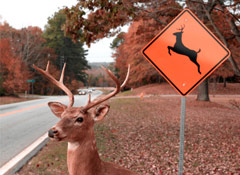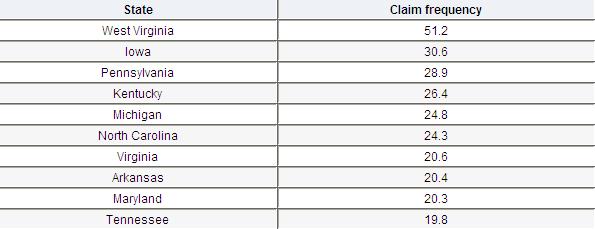As you travel this Thanksgiving weekend, bear in mind that turkeys aren't the only animals on the run. November is the highest month for deer collisions--more than three times as common compared to August, which is the lowest month for insurance claims according to a new report from the Highway Loss Data Institute (HLDI).

HLDI looked at the claims for animal strikes from 18 insurers that specify the claim was related to a collision with an animal. They found that from 2006 to 2011, there was an average of 6.5 animal strike claims per 1,000 insured vehicle years. During that six-year period, monthly frequencies ranged from 3.9 in August to 14.1 in November. Claims rise steeply in October and peak in November which coincides with deer mating season. The claims then drop off in the winter months of December and January.
Below is a list of the states with the highest claims for animal strikes.

Animal-vehicle collisions present a danger to motorists, property, and wildlife, but there are precautions you can take to help avoid having a deer or other animal have an unfriendly encounter with your car.
- Slow down. Watch for deer especially around dawn and between the hours of 6-9 p.m. when they are most active.
- Be aware. Look out for deer-crossing signs and wooded areas where deer or other animals would likely travel. And if you travel the same route to and from work everyday, you might find deer consistently grazing in the same fields. Make a mental note of when and where you regularly see these animals.
- Be alert. If you see an animal on the side of the road, slow down, and, at night, when traffic permits, put on your high-beams for greater visibility.
- Brake, don't swerve. Swerving to avoid an animal can put you at risk for hitting another vehicle or losing control of your own car. It can also confuse the animal as to which way to go. Just slow down as quickly and safely as you can. Your odds of surviving an accident are better hitting an animal than another car.
- Assume they have friends. The phrase "where's there's one, there's usually more" often holds true. Deer travel in groups, so if you see one run across the road, expect others to follow.
- Don't rely on deer whistles. The whims of wild animals are not beholden to this technology.
- Buckle up. A seat belt is your best defense for minimizing your risk in a crash. An Insurance Institute for Highway Safety study found that 60 percent of the people killed in animal-vehicle collisions weren't wearing seat belts.
If you hit an animal, move your car safely off the road and call police or animal control. Do not attempt to touch an injured animal. Call your insurance company when you get home. Animal collisions are usually covered in your policy.
—Liza Barth